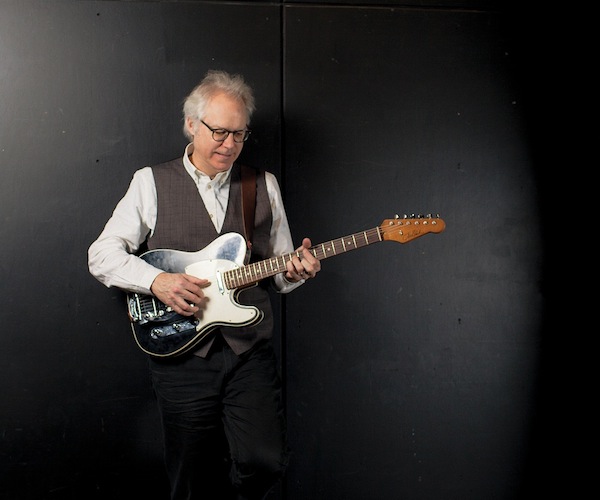Jazz Review: Bill Frisell’s Americana Dreams
Bill Frisell and his quartet performed a program of well-worn American hits whose juxtapositions allowed you to make your own cross-references and draw your own conclusions.

Guitarist Bill Frisell — The overall effect of his touches was cinematic, revelatory of of his inner Americana dreamscape. Photo: Paul Moore.
By Jon Garelick
There were times during guitarist and composer Bill Frisell’s late show at Jazz at Lincoln Center’s Appel Room on Saturday night (May 30) when I thought, “This is so simple — it couldn’t possibly be interesting.” It wasn’t just the tunes — a range of decades-spanning well-worn hits, from “St. Louis Blues” and “House of the Rising Sun” to “Proud Mary” and “The Weight.” It was Frisell’s overall restraint, his intention to approach the music almost purely for its melodic content, and hardly at all, it seemed, as “jazz.”
That was doubly surprising given the heavy firepower of his band — alto saxophonist Greg Osby, pianist Craig Taborn, drummer Rudy Royston. This was a top-shelf jazz quartet, in its parts responsible for some of the headiest music of the past decade (check Taborn’s 2013 trio album on ECM, Chants, or just about anything by Osby).
But here they all seemed to be under Frisell’s spell, content to lavish all their attention on the melody and arrangements, with a minimum of harmonic elaboration or soloistic flash. And yet… And yet. They made us hear these songs anew, without the distraction of lyrics. Instead, the band tended to sing the melodies on their instruments in simple three-part unison – piano, horn, and guitar. The four Friday and Saturday night shows were wrapping up the Roots of Americana series that Frisell has been curating over the last two years at Lincoln Center, and these last shows, specifically, were titled: “Up and Down the Mississippi: Traveling Highway 61.” It was the kind of program whose juxtapositions allowed you to make your own cross-references and draw your own conclusions. One implicit theme that kept popping up was the influence of the church on American music. In this regard, Taborn’s organ was a boon. So “Love Me Tender” revealed Elvis’s love of spirituals and gospel. And their version of “The Weight” brought back the Band’s performance of the tune with the Staple Singers in The Last Waltz. Even “You Are My Sunshine” had a kind of Sunday-morning serenity.
Much of the 90-minute set was played without interruption, and there were no between-song announcements. Instead, there were a few rubato interludes, Taborn playing a piano melody line quietly, almost like a memory, under the tensions of a repeated guitar note or drum beat. “House of the Rising Sun” appeared in three separate variations, sometimes quite abstract. The next day, when I sent a request for the setlist through his management, Frisell wrote back identifying one tune I hadn’t been able to place as Miles Davis and Bill Evans’s “Blue in Green,” adding that the “beginning and ending sections” borrowed “a pattern from Ron Carter’s tune ‘Mood’ from [Miles’s] E.S.P. adapted to the harmony of ‘Blue in Green’ . . . and the band playing all of Miles improvisations” [sic]. The overall effect of these touches was cinematic, part of Frisell’s inner Americana dreamscape.
Frisell provided an array of simple effects, chords, sustains, and beautifully articulated melodic lines in various registers. In “The Weight,” he came in with an impossibly low, broad-toned reading of the melody that quickly climbed into the upper register. Royston got the churchy feel of the proceedings just right — in his one solo feature (a transition between Sam Cooke’s “Bring It on Home to Me” and the bebop swing of Charles Lloyd’s “Nu Blues”) he came in low and slow, using his bass drum as part of a call-and-response pattern with the rest of his kit.
Most of the show was low and slow, but with a steady groove — “Bring It On Home To Me,” Kern and Hammerstein’s “Ol’ Man River,” Muddy Waters’s “I Can’t Be Satisfied,” an encore of “Way Down Yonder in New Orleans. The last made me think of all the Bourbon Street Dixieland I’ve heard, particularly unlikely coming from this band. But they pulled it off. And if you’re wondering about the relevance of Miles and Charles Lloyd, they are from Mississippi towns, after all — St. Louis and Memphis, respectively. The one disappointment of the night was the absence of the fine cornet player Ron Miles, who was advertised and listed in the program. His absence was never explained. Too bad — it would have been nice to hear cornet on that encore, or to hear how Frisell might have deployed this particular Miles as part of the mix.
Jon Garelick is a member of The Boston Globe editorial board. A former arts editor at the Boston Phoenix, he writes frequently about jazz for the Globe, The Arts Fuse, and other publications.
Tagged: American music, Bill-Frisell, Craig Taborn, Greg Osby, Roots of Americana
